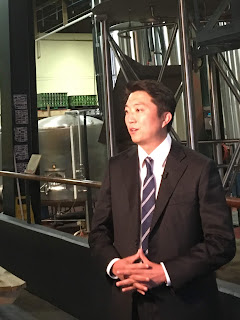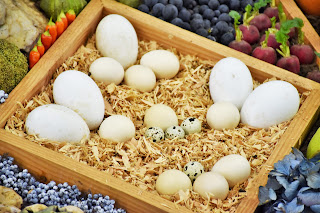Communications
 |
| A can of Amazing Brewing's fresh hop beer. The Seoul-based brewery used Washington hops fresh from the field to bring Korea that unique, fresh hop flavor. |
Capturing the bright complexities of fresh hops in beer is a lot like trying to catch a fall flash of lighting in a bottle. For a true “fresh hop” beer – a nectar bursting with the flavors of cut grass, flowers, citrus or even pine trees -- brewers must add the delicate green hops cones to the brew within 24 hours of harvest.
That’s a tall order even for craft brewers in Washington state, where they have close access to some of the world’s top hop farms and almost three quarters of the nation’s total hops production.
For breweries in Seoul, Korea, trying to catch real lightning may be more realistic.
That didn’t stop Yakima Chief Hops. When they got the idea late last summer, they approached their Korean distributor to see if he would be willing to give it a try and with his nod, the bold adventure began.
The grower-owned network of family hops farms already supplies premium hops to brewers around the world in dried and frozen forms, but it had never attempted to deliver fresh product to Korea for a fresh hop beer.
The challenge was great
Though it seemed impossible, the siren call of a juicy new batch of India pale ale that would be brewed on the other side of the globe was just too intoxicating to ignore.
To pull it off, Yakima Chief not only had to ship the fresh hops cones from a field in the Yakima Valley to a brewery on the other side of the world in one day, they would also have to undergo U.S. export inspections and pass rigorous Korean Customs Service phytosanitary requirements on the way.
The company enlisted the help of WSDA International Marketing and Plant Services staff to help whisk an aromatic and highly perishable shipment out of Washington and through Korea Customs Service (KCS) fast enough for breweries in Seoul to hop up their beer.
 |
| Danny Kim, WSDA's trade representative in South Korea worked with Korean customs officials to help bring in fresh hops. |
"I took this crazy idea to Julie a few months ago and with her help and a lot of other great people, it all lined up," Lambert said.
Johnson worked alongside Yakima Chief throughout the process and looped in WSDA’s trade representative in South Korea, Danny Kim, who worked with the Korean customs officials. Johnson also connected the company with Sherry Lagerstam in WSDA’s Plant Services Program to find ways to streamline the domestic inspections process.
Lagerstam said she worked with Lambert and Yakima Chief warehouse staff to decide if it would be better to meet at the hops fields or the warehouse. In a seamless swoop, she double-checked the requirements, inspected the hops (at the warehouse) and issued the Phytosanitary Certificates.
A big win
Lambert acknowledged the challenges of sending fresh hops to the other side of the globe, through a strict inspection process, before they spoiled.
“A huge thanks to all for the quick responses and willingness to accommodate our tight timeline. Everyone’s help was deeply appreciated and we are so excited the fresh hops made it through Korean customs in a timely fashion,” Lambert said. “Shout-outs to you guys at Washington State Department of Agriculture for your major contributions to this effort – on the inspection here in the U.S. and with customs in Korea. We could not have done this without you.”
"It was a big win for all of us," he said.
Korean breweries and fresh hop beer
Yakima Chief's Korean Distributor, Brewsource, lined up three breweries to receive the hops.
Seoul Brewery was the first to brew with the fresh “Mosaic” hops. The brewery adjusted its entire week’s schedule and planned for a 3 a.m. brew day to make a fresh hop version of their signature Salinger Rye India Pale Ale. The beer was so popular, they sold out in about a week. Those lucky enough to taste it said it was: “Amazing, super juicy and drinkable with tropical flavors that really shine.”
Amazing Brewery also received the fresh Mosaic hops. They produced a wet-hop IPA called “Yakima Express.” This beer was scheduled to be released Oct. 25 and will also be available in cans that showcase the Yakima Chief Ranches logo.
Finally, Playground Brewery brewed a double IPA called “Big & Certain Hoppiness.” This beer is scheduled to be released on Nov. 1.
New Frontiers
Thanks to this year’s success, Mike Goettl, Yakima Chief CEO, said he has a few new challenges for fresh hop beer next year. He’s added Taiwan and Japan along with Korea as challenges for 2020 fresh hops.






